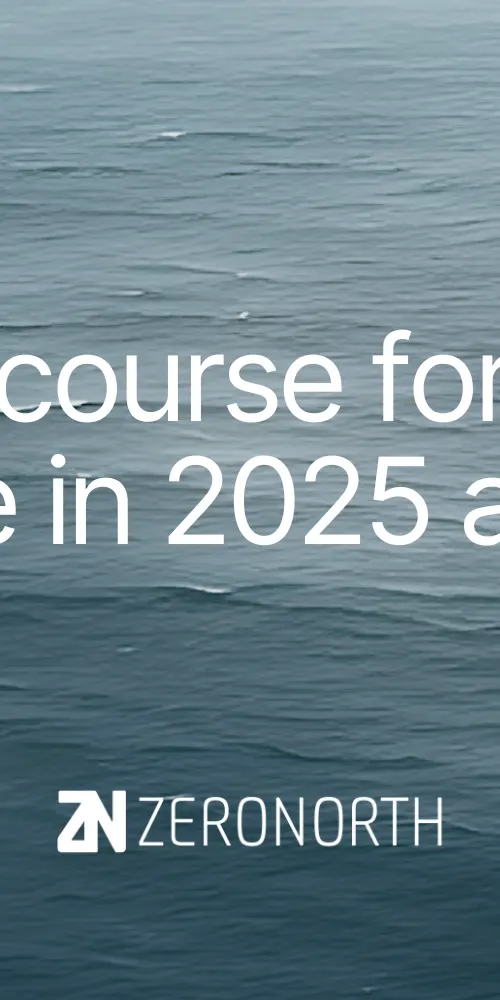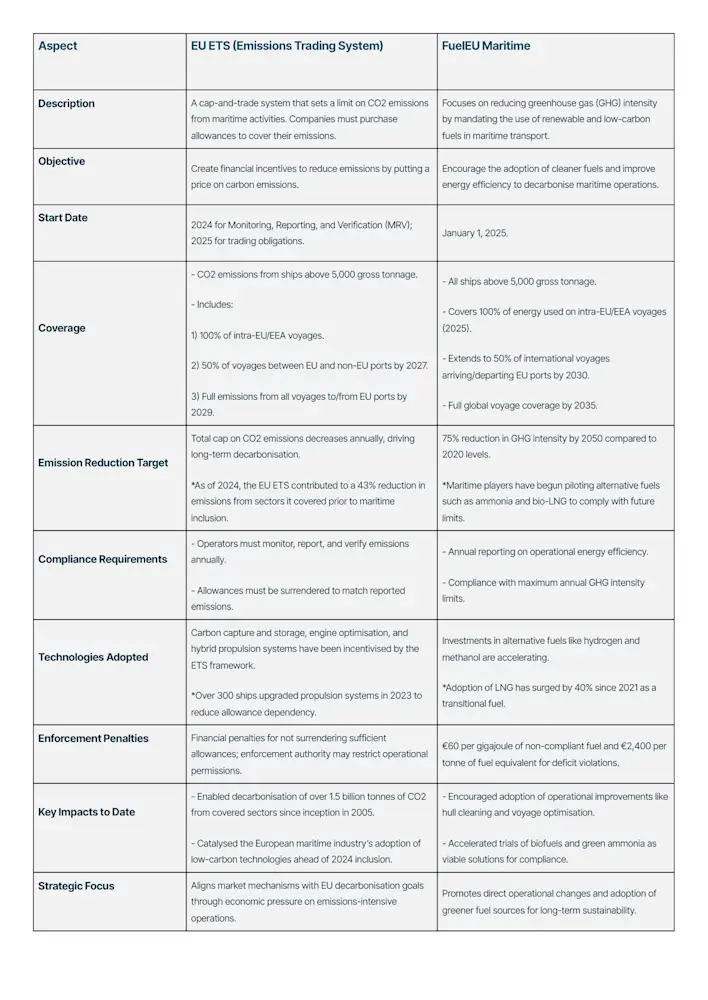Prepare your fleet for EU’s Emissions regulations

As 2024 ends, the maritime shipping industry faces a pivotal turning point. The European Union has set ambitious goals to achieve climate neutrality by 2050 and reduce greenhouse gas emissions from all sectors, including the maritime shipping industry. To drive this transition, the EU introduced two major European Union (EU) regulations—FuelEU Maritime and the EU Emissions Trading System (EU ETS)—poised to reshape operations in 2025, compelling stakeholders to rethink their approach to fuel consumption, emissions, and sustainability. These regulations signal a new era, where compliance and innovation will go hand-in-hand to drive the industry forward.
FuelEU Maritime aims to increase the use of renewable and low-carbon fuels in maritime transport, setting limits on the greenhouse gas intensity of energy used by ships calling at European ports. The regulation will come into effect on January 1, 2025, with increasingly stringent requirements over time.
The EU ETS, on the other hand, is a cap-and-trade system that sets a limit on overall emissions from certain sectors, including maritime shipping. Started in 2024, shipping companies need to purchase and surrender allowances for their emissions. This creates a financial incentive to reduce emissions and invest in more sustainable practices.
Understanding FuelEU Maritime
The FuelEU Maritime initiative aims to drive decarbonisation in the maritime sector by setting requirements on the greenhouse gas (GHG) intensity of energy used by ships trading in the EU or European Economic Area. It establishes progressively stricter limits on the annual average GHG intensity of the energy used on-board, including both voyages and port calls.
Under FuelEU Maritime, ships above 5,000 gross tonnage will be required to calculate and report their annual operational energy efficiency. Starting in 2025, ships will need to comply with a maximum annual GHG intensity limit, which will become increasingly stringent over time, reaching -75% by 2050 compared to 2020 levels.
The regulation applies to 100% of the energy used on voyages within the EU/EEA from 2025, and 50% of the energy used on voyages departing or arriving at an EU/EEA port from 2030 onwards. By 2035, it will cover 100% of energy used on all voyages to and from EU/EEA ports.
Unpacking the EU Emissions Trading System
The EU Emissions Trading System (EU ETS) is a cornerstone of the European Union's policy to combat climate change and reduce greenhouse gas emissions cost-effectively. As a 'cap-and-trade' system, it sets a cap on the total amount of certain greenhouse gases that can be emitted by sectors covered under the system. Companies receive or buy emission allowances, which they can trade with one another as needed. Over time, the cap is reduced, forcing companies to lower their emissions.
Started since January 2024, the EU ETS has extended to cover CO2 emissions from all large ships (of 5,000 gross tonnage and above) performing voyages between European Economic Area (EEA) ports, as well as 50% of emissions from voyages starting or ending outside the EEA and calling at an EEA port. Ship operators have to monitor and report verified annual emissions data, as well as surrender sufficient emission allowances to cover their ships' emissions.
EU ETS and FuelEU Maritime: Insights into impact, compliance, and future goals

Deadlines on the horizon
Maritime companies need to act swiftly to meet the phased rollout of the FuelEU Maritime and EU Emissions Trading System (ETS) regulations. According to the EU guidance document, key dates include:
FuelEU Maritime:
January 1, 2025: Regulations take effect for ships over 5,000 gross tonnage trading to/from EU ports
January 1, 2030: More stringent emissions intensity targets apply
January 1, 2035: Further tightening of emissions limits
EU ETS for Shipping:
January 1, 2024: Monitoring, reporting, and verification requirements begin
January 1, 2025: Emissions trading obligations start for intra-EU voyages
January 1, 2027: Obligations extend to 50% of emissions from voyages departing or arriving at an EU port
January 1, 2029: 100% of emissions from all voyages to/from EU ports are covered
Companies must move quickly to assess their fleets, optimise operations, and implement emissions tracking to ensure full compliance by the impending deadlines.
Risks of non-compliance
Maritime companies that fail to meet the requirements of FuelEU Maritime and the EU ETS face severe financial penalties. As outlined by ERG Legal, breaches of the FuelEU Maritime regulation will be fined €60 per gigajoule of non-compliant fuel consumed. Additionally, DNV states that under FuelEU, the compliance deficit is calculated into energy based on the actual GHG intensity of the ship, applying a penalty of €2,400 per tonne of fuel equivalent.
Beyond the hefty fines, non-compliance also risks reputational damage and potential disruptions to operations. As sustainability concerns intensify among consumers, shippers, and investors, companies seen as laggards on emissions reductions may face backlash. There is also the possibility of operational constraints or denial of access to certain ports for vessels that do not adhere to the new environmental standards.
Navigating the new regulatory waters
The maritime industry faces a sea of challenges as it navigates the uncharted waters of new environmental regulations like FuelEU Maritime and the EU Emissions Trading System (EU ETS). As highlighted by Oloruntobi (2023), accelerating digitalisation is crucial for overcoming key hurdles in the sustainable transition towards greener and cleaner shipping operations.
Early preparation is paramount for maritime companies to avoid being caught adrift in the face of looming deadlines and stringent compliance requirements. Proactive measures, such as optimising vessel operations, voyage planning, and bunkering strategies, can pave the way for a smoother journey towards emissions reductions and regulatory adherence. Failure to chart a course for compliance could result in hefty penalties and reputational damage, as underscored by Sinay (2023).
Getting ahead of the curve
With the new regulations on the horizon, proactive maritime companies are taking steps now to prepare for compliance and reduce their emissions footprint.
Key actions include:
- Implementing robust data tracking systems to monitor fuel consumption, emissions, and operational efficiency across their fleet. As the adage goes, "you can't manage what you don't measure." Having reliable data will be critical for reporting requirements and identifying areas for improvement.
- Evaluating and implementing efficiency measures like voyage optimisation, hull cleaning, propeller polishing, and engine tuning. Even small operational tweaks can yield significant emissions reductions when applied across an entire fleet.
- Developing a strategic decarbonisation roadmap that aligns with the new regulatory timelines. This includes assessing future fuel needs, evaluating low-carbon fuel options, and planning for potential vessel retrofits or fleet renewals to meet tightening emissions standards over time.
By getting out in front of FuelEU Maritime and the EU ETS now, forward-thinking companies can avoid scrambling for compliance later and position themselves as leaders in sustainable shipping.
Our solution
ZeroNorth offers a comprehensive platform designed to help maritime companies optimise operations, reduce emissions, and stay compliant with emerging regulations like FuelEU Maritime and the EU Emissions Trading System (EU ETS). The platform harmonises commercial, safety, and environmental imperatives, providing a single source of truth for owners and operators to boost collaboration across departments and elevate fleet performance.
At the core of ZeroNorth's solution is its powerful optimisation engine, which leverages advanced algorithms and machine learning to identify opportunities for efficiency gains across voyage, vessel, and bunker operations. By optimising factors such as speed, routing, trim, and bunker procurement, the platform enables companies to minimise fuel consumption and associated emissions while maximising commercial performance. This integrated approach ensures that sustainability efforts are aligned with business objectives, creating a win-win scenario for the environment and the bottom line. Talk to our experts by visiting zeronorth.com/book-a-demo to learn more.
Streamlining compliance reporting
Staying compliant with FuelEU Maritime and the EU ETS will require rigorous emissions monitoring, reporting, and documentation. ZeroNorth's platform provides maritime companies with powerful tools to streamline this process. The solution offers automated emissions tracking and reporting capabilities that align with the requirements outlined in the EU climate action for reducing emissions from the shipping sector.
Companies can leverage ZeroNorth's platform to capture and consolidate emissions data across their fleet operations. This data can then be seamlessly formatted into the necessary compliance reports and documents for submission to the relevant authorities. With built-in verification checks and audit trails, ZeroNorth ensures the accuracy and integrity of emissions data, minimising the risk of non-compliance penalties.
Expertise you can rely on
At ZeroNorth, we understand the complexities of the maritime industry and the challenges companies face in navigating an evolving regulatory landscape. With years of experience and deep domain expertise, our team provides invaluable insights and guidance to help shipping companies stay ahead of the curve.
We were at the forefront of the industry when we launched our CII analytics and optimisation solution in December 2021, well before the CII regulations came into effect. This proactive approach exemplifies our commitment to helping our clients anticipate and adapt to new regulations, minimising disruptions to their operations.
Our team of experts closely monitor regulatory developments, offering practical advice and tailored solutions to ensure our clients remain compliant with the latest requirements. We leverage our extensive industry knowledge to provide a comprehensive understanding of the implications of regulations like FuelEU Maritime and EU ETS, enabling our clients to make informed decisions and implement effective strategies.
Setting a course for sustainability
As the maritime industry navigates the complex landscape of new emissions regulations, partnering with ZeroNorth can provide a clear path forward. ZeroNorth's mission is to enable sustainable global trade by harnessing the power of data and digital solutions. With our deep expertise and innovative platform, we offer a comprehensive suite of tools to help shipping companies optimise operations, manage emissions, and stay compliant.
By collaborating with ZeroNorth, maritime companies can future-proof their operations, mitigate risks, and position themselves as industry leaders in environmental stewardship. ZeroNorth's commitment to driving immediate emissions reductions underscores their dedication to supporting the industry's transition towards a more sustainable future.
Take the first step towards embracing sustainability and digitalisation by partnering with ZeroNorth. Our Vessel Reporting Platform offers a comprehensive solution for data gathering, transparency, and emissions reductions, empowering you to navigate the new regulatory landscape with confidence.
Conclusion
The maritime shipping industry is at a pivotal juncture, facing new regulations like FuelEU Maritime and the EU Emissions Trading System that aim to drastically reduce its environmental impact. These initiatives underscore the urgency of transitioning to sustainable practices and slashing greenhouse gas emissions. Companies that fail to comply risk hefty penalties and reputational damage, making it imperative to act now.
ZeroNorth stands ready to guide maritime organisations through this complex landscape, leveraging its integrated platform, emissions management capabilities, and deep industry expertise. By partnering with ZeroNorth, companies can optimise operations, streamline compliance reporting, and chart a course toward a greener, more sustainable future for global trade.